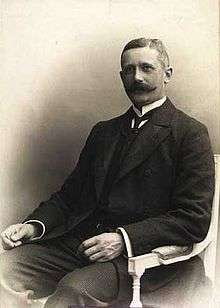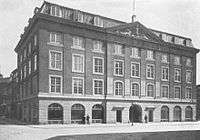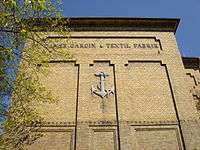Christian Hasselbalch
| Christian Hasselbalch | |
|---|---|
 Hasselbalch photographed by Julie Laurberg in 1903 | |
| Born |
27 February 1851 Randers, Denmark |
| Died |
7 August 1925 (aged 74) Rungsted, Denmark |
| Nationality | Danish |
| Occupation | businessman, industrialist |
Christian Hasselbalch (27 February 1851 - 7 August 1925) was a Danish industrialist and merchant. He founded Hasselbalch & Co.
Early life
Christian Hasselbalch was born into a family of merchants in Randers. His parents were merchant Steen Hasselbach (1820–61) and Caroline Margrethe Hasselbach née Hoge (1826–93). He attended Randers Lærde Skole until 1865 and then apprenticed as a textile merchant in Århus. He later became a retail clerk at Vett & Wessel's new branch in Horsens until her was appointed to manager of the company's Nakskov branch in 1876.[1]
Hasselbach & Co.

In 1892, Hasselbalch was licensed as a grocer in Copenhagen and started his own business. In 1889, he became the first manufacturer of curtains in Denmark. The company was at first based in rented rooms at Peter Bangs Vej with just one weave but he later acquired Lyngby Søndre Mølle in Kongens Lyngby and opened a new factory at the site in 1892. It was expanded several times and became the largest employer in the town. In the 1890s, he also established curtains factories in both Sweden and Norway.
In 1910, he started Dansk Merceriseringsanstalt. He remained active in his companies until his death.
Other professional engagements
He was a member of Sø- og handelsretten in 1892–1906. In 1909–24, he chaired Privatbanken's bank council. He also sat on the board of DFDS.
Philanthropy
Hasselbalch was also a patron of the arts and a benefactor of several social courses. He was involved in the construction of workers' housing in Kongens Lyngby and was active in the Association for Resocialisation of Exconvicts which was founded in 1902 as well as work among citizens with disabilities.
Legacy

Hasselbalch died in on 6 August 1925 and is buried at Vestre Cemetery in Copenhagen. After his death, his company, Hasselbalch & Co. (Dansk Gardin- og Textil-Fabrik and Dansk Farveri- og Merceriserings-Anstalt) was passed on to his son Hugo Helms Hasselbalch (1888–1957). He was also CEO of the companies AB Svenska Gardinfabriken in Gothenburg and A/S Norsk Gardinfabrik in Halden. In 1955, the company was floated on the stock exchange. The curtains factory closed in 1962.

The former head office of Hasselbalch's company is located at Kejsergade 2 in Copenhagen. The building is from 1904–05 and was designed by Valdemar Ingemann. The curtain factory's former buildings in Kongens Lyngby is located at Gammel Lundtoftegade. The complex dates from 1898 and is built in yellow bricks and. It was designed by Bernhard Ingemann. Lyngby Søndre Mølle's current building was built for the curtain factory by Valdemar Ingemann following a fire in 1902. The housing development for workers at the factory is today known as Hyldehaverne.[2] Hasselbalch's former home is located at Kristianiagade 3. The house was built in 1897-98 ro design by Kristoffer Varming. The house is now part of the Russian Embassy. Hasselbalch's summer residence in Tungsted, villa Piniehøj, has been demolished. It was from 1899 and also designed by Varming.
References
- ↑ "Chr. Hasselbalch" (in Danish). Dansk Biografisk Leksikon. Retrieved 9 February 2017.
- ↑ "Kampen om Hyldehaverne er slut" (in Danish). Det Grønne Område. Retrieved 9 February 2017.
External links
| Wikimedia Commons has media related to Christian Hasselbalch. |
- Christian Hasselbalch at Geni